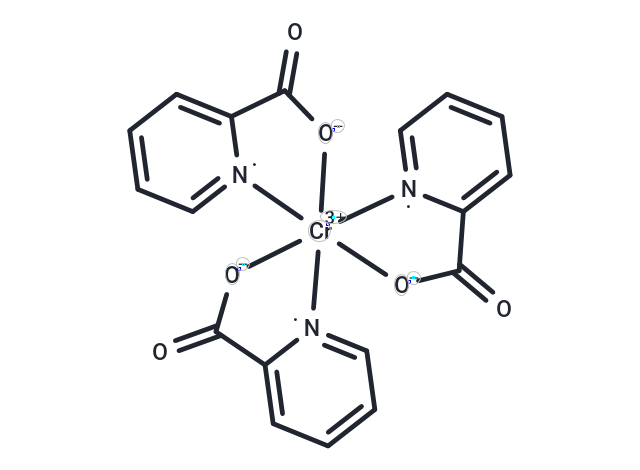Shopping Cart
- Remove All
 Your shopping cart is currently empty
Your shopping cart is currently empty

Chromium picolinate causes DNA damage and mutation. It is an activator of p38.

| Pack Size | Price | Availability | Quantity |
|---|---|---|---|
| 100 mg | $41 | In Stock |
| Description | Chromium picolinate causes DNA damage and mutation. It is an activator of p38. |
| In vivo | Acrivastine (usually 8mg three times daily) is an effective and well-tolerated antihistamine in the treatment of chronic urticaria and allergic rhinitis. Acrivastine causes less drowsiness than clemastine, the incidence of adverse effects being indistinguishable from that with placebo or terfenadine. In the treatment of dermatoses in which histamine has a pathogenetic role, the efficacy of acrivastine is superior to that of placebo and similar to that of usual dosages of clemastine, hydroxyzine, chlorpheniramine, cyproheptadine or terfenadine [1]. Both 4 mg and 8 mg acrivastine alleviate the symptoms of seasonal allergic rhinitis with significant improvements in the symptom scores for sneezing, running nose and the calculated overall score. In addition, 8 mg acrivastine reduces the symptom scores for watery eyes and itchy throat. Acrivastine is both well tolerated and effective in the treatment of seasonal allergic rhinitis [2]. |
| Molecular Weight | 418.3 |
| Formula | C18H12CrN3O6 |
| Cas No. | 14639-25-9 |
| Smiles | O=C1[O-][Cr+3]23([N]=4C(C(=O)[O-]2)=CC=CC4)([N]=5C(C(=O)[O-]3)=CC=CC5)[N]=6C1=CC=CC6 |
| Relative Density. | no data available |
| Storage | Powder: -20°C for 3 years | In solvent: -80°C for 1 year | Shipping with blue ice. | ||||||||||||||||||||
| Solubility Information | DMSO: 4.18 mg/mL (10 mM), Sonication is recommended. | ||||||||||||||||||||
Solution Preparation Table | |||||||||||||||||||||
DMSO
| |||||||||||||||||||||

Copyright © 2015-2025 TargetMol Chemicals Inc. All Rights Reserved.